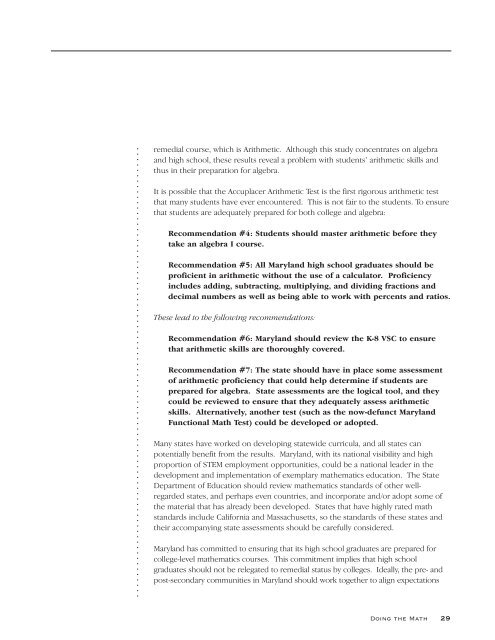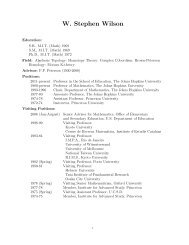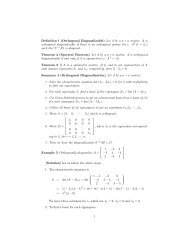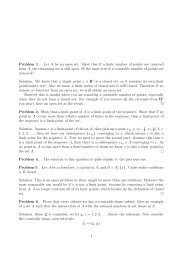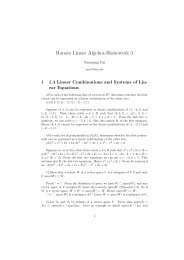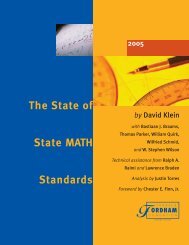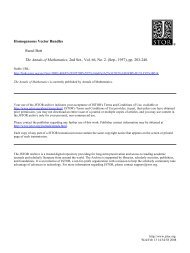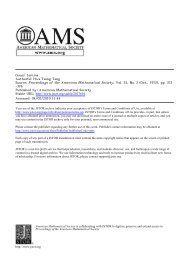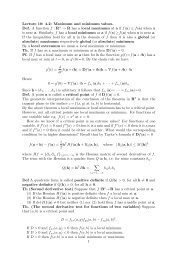Doing the Math - JHU Mathematics - Johns Hopkins University
Doing the Math - JHU Mathematics - Johns Hopkins University
Doing the Math - JHU Mathematics - Johns Hopkins University
Create successful ePaper yourself
Turn your PDF publications into a flip-book with our unique Google optimized e-Paper software.
. . . . . . . . . . . . . . . . . . . . . . . . . . . . . . . . . . . . . . . . . . . . . . . . . . . . . . . . . . . . . . . . . . . . . . . . . . . . . . . . . . . .<br />
remedial course, which is Arithmetic. Although this study concentrates on algebra<br />
and high school, <strong>the</strong>se results reveal a problem with students’ arithmetic skills and<br />
thus in <strong>the</strong>ir preparation for algebra.<br />
It is possible that <strong>the</strong> Accuplacer Arithmetic Test is <strong>the</strong> first rigorous arithmetic test<br />
that many students have ever encountered. This is not fair to <strong>the</strong> students. To ensure<br />
that students are adequately prepared for both college and algebra:<br />
Recommendation #4: Students should master arithmetic before <strong>the</strong>y<br />
take an algebra I course.<br />
Recommendation #5: All Maryland high school graduates should be<br />
proficient in arithmetic without <strong>the</strong> use of a calculator. Proficiency<br />
includes adding, subtracting, multiplying, and dividing fractions and<br />
decimal numbers as well as being able to work with percents and ratios.<br />
These lead to <strong>the</strong> following recommendations:<br />
Recommendation #6: Maryland should review <strong>the</strong> K-8 VSC to ensure<br />
that arithmetic skills are thoroughly covered.<br />
Recommendation #7: The state should have in place some assessment<br />
of arithmetic proficiency that could help determine if students are<br />
prepared for algebra. State assessments are <strong>the</strong> logical tool, and <strong>the</strong>y<br />
could be reviewed to ensure that <strong>the</strong>y adequately assess arithmetic<br />
skills. Alternatively, ano<strong>the</strong>r test (such as <strong>the</strong> now-defunct Maryland<br />
Functional <strong>Math</strong> Test) could be developed or adopted.<br />
Many states have worked on developing statewide curricula, and all states can<br />
potentially benefit from <strong>the</strong> results. Maryland, with its national visibility and high<br />
proportion of STEM employment opportunities, could be a national leader in <strong>the</strong><br />
development and implementation of exemplary ma<strong>the</strong>matics education. The State<br />
Department of Education should review ma<strong>the</strong>matics standards of o<strong>the</strong>r wellregarded<br />
states, and perhaps even countries, and incorporate and/or adopt some of<br />
<strong>the</strong> material that has already been developed. States that have highly rated math<br />
standards include California and Massachusetts, so <strong>the</strong> standards of <strong>the</strong>se states and<br />
<strong>the</strong>ir accompanying state assessments should be carefully considered.<br />
Maryland has committed to ensuring that its high school graduates are prepared for<br />
college-level ma<strong>the</strong>matics courses. This commitment implies that high school<br />
graduates should not be relegated to remedial status by colleges. Ideally, <strong>the</strong> pre- and<br />
post-secondary communities in Maryland should work toge<strong>the</strong>r to align expectations<br />
<strong>Doing</strong> <strong>the</strong> <strong>Math</strong> 29


